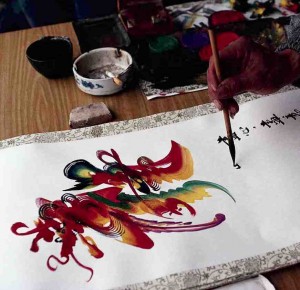 A Zen master planned to make a painting. He had his chief disciple sit by his side to tell him if his painting was Zen. This means the painting has to be done spontaneously and without hesitation. Unfortunately having a disciple watch over his shoulder was not a good idea as this put pressure on the master. Immediately things started going wrong.
A Zen master planned to make a painting. He had his chief disciple sit by his side to tell him if his painting was Zen. This means the painting has to be done spontaneously and without hesitation. Unfortunately having a disciple watch over his shoulder was not a good idea as this put pressure on the master. Immediately things started going wrong.
In Japan or in China, the whole art of calligraphy is done on rice-paper. This is a very sensitive and fragile paper. If you hesitate a little, for centuries it can be known where the calligrapher hesitated, because more ink spreads into the rice-paper and makes it a mess. It is very difficult to deceive on rice-paper. You have to go on flowing without any hesitation in your strokes. Even for a single split moment if you hesitate, any one who has a keen eye will immediately say, “It is not a Zen painting at all”. This is because a Zen painting has to be a spontaneous painting that flows out in a creative act.
The master tried and tried and the more he tried the more difficult it became. Soon he started perspiring. And the disciple was sitting there and shaking his head thinking, ‘No, this is not perfect.’ As this continued more and more mistakes were being made by the master.
Then the ink was running out so the master said, “You go out and prepare more ink.” While the disciple was outside preparing the ink, the master did his masterpiece. When the discipline came in and saw what his master had done, he said, “Master, but this is perfect! What happened?”
The master laughed, “I became aware of one thing: your presence. The very idea that somebody is there to appreciate or to condemn, to say no or yes, disturbed my inner tranquility. Now I will never be disturbed. I have come to know that I was trying to make it perfect and that was the only reason for its not being perfect.”
The quest for perfection is nothing but fodder for the ego looking for appreciation. As a goal in itself it is a terrible waste of time. Rather the quest should be to allow the soul to freely express itself without any hindrance from the ego, and perfection will be the natural result. However it is important to understand what we mean by “Perfection” here. Perfection does not mean something with zero flaws. Even the most precious diamond has flaws in it. So also even the most valuable painting will have flaws. We must give up on using the quest for perfection as an excuse to beat ourselves (or others) with. Rather we should allow the creative process to flow unhindered and accept the results as “Perfect”. This means that these are the best results that are possible under the given circumstances and with our current level of ability. If the results are not acceptable it means we need to upgrade our skills or make improvement in the process. If we free up the energy that goes in being something we are not, or scaling a bar that has been set too high, we can then use this energy to learn and improve our skills.
The quest for perfection is better expressed in terms of the quest to unblock the creative process. Rather than making perfection a goal let it be an unintended consequence. Rather than asking the question: “What can I do to make this perfect?” we should ask: “Am I getting in the way by too much worry? And if so what can I do to reduce this?” If we ask the right questions and rephrase our goals we will get much better results just as the Zen master did. In addition we shall learn more and have more fun along the way.
Source: Unknown. A version of this story came to us via e-mail. If anybody is aware of the source of this story please let us know and we will be happy to provide attribution.
You may also like: Not Far From Buddhahood

these kind of stories are born and can’t be attribution.to be any one as it is for every one and by everyone
This artwork I have been doing is very zen, meaning it happened spontaneously, without a plan, in an effortless flow of creativity. Peace!